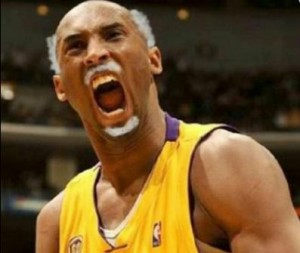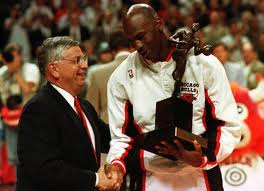 The troubling part of Kobe Bryant’s descent into mediocrity – to be kind and properly deferential – is that the more gullible among us shared his vision of himself.
The troubling part of Kobe Bryant’s descent into mediocrity – to be kind and properly deferential – is that the more gullible among us shared his vision of himself.
Yes, we were aware of Achilles, knee and shoulder injuries that caused him to miss 123 of 164 games the last two years. But this is basketball’s version of the bionic man. Some of us believed what Lakers coach Byron Scott said after Bryant’s right rotator cuff injury in January.
“I think the biggest thing with Kobe, as long as [the media are] saying that he’s done, he’s going to come back,” Scott said. “I think he proved his point this year that he still has a lot left in the tank. He’s still one of the best players in the league.”
Somehow, we thought, Bryant was going to continue dunking on Father Time. When I was in Las Vegas in October, I saw the over-under on Lakers victories was 30 this season and my first thought was: “You know, Kobe’s coming back. That might not be a bad bet.”
It was, and during a weekend of bad bets, that’s at least one I did not make.
 Bryant’s decline was classic for a 37-year-old player who was in his 20th season, had played more than 55,000 regular season and playoff minutes and had more than 20 injuries. Classic because it is predictable that wear and tear and birthdays will result in deteriorating skills.
Bryant’s decline was classic for a 37-year-old player who was in his 20th season, had played more than 55,000 regular season and playoff minutes and had more than 20 injuries. Classic because it is predictable that wear and tear and birthdays will result in deteriorating skills.
That was clearly what happened. And the decline was brutal. When Bryant made the announcement Sunday that he would be retiring at the end of the season, his .311 field goal percentage was the worst of any NBA player with at least 150 field goal attempts.
Bryant has yet to make at least half of his shots even once. In the three-game stretch that ended Sunday with his announcement, Bryant was 1-of-14, 7-of-20 and 4-of-20 from the field. That’s .222. That’s not Kobe and it became evident, even to him. So he left his competitive, defiant self behind and gave in to logic. When it was no longer fun or dignified, Bryant announced the end will come in April.
“I just had to accept the fact that I don’t want to do this anymore,” he told reporters after the 107-103 home loss to the Pacers on Sunday. “And I’m OK with that. Once I accepted that, then it became time to let everyone know. It takes a load off my shoulders and everybody else’s. It was just the right thing to do.”
Although watching the final days – like his 7-of-26 night Tuesday in the Lakers’ 103-91 loss to the JV Sixers, which ended a 28-game Philadelphia losing streak that dated back to last season – has not been pretty and there is no sign it will get better, it will not take away from Kobe’s legacy.
When his career is celebrated, we will ignore the current struggles and begin discussions of his greatness by noting there are two players in history who have scored more points than him – Kareem Abdul-Jabbar and Karl Malone.
His brilliance has always invited the loftiest of comparisons: Who’s better – Kobe or Michael Jordan? Some of his feats, however, are more Wilt-like. Consider the two greatest individual scoring games in history.
1. 100 – Wilt Chamberlain, March 2, 1962.
2. 81 – Kobe Bryant, January 22, 2006.
Remember this? December 20, 2005; After three quarters, Kobe Bryant 62, Mavericks 61. And he sat out the fourth quarter. Before Kobe, only Wilt had games like that.
 Although I was among the last group of holdouts who were reluctant to pass the mantle of best player in the world from Kobe to LeBron James, I’ve never participated in the MJ vs. Kobe argument for one reason: Kobe has always said Michael was the better player. At the height of the discussion, someone brought it up to Kobe and he said, “C’mon, man. We’re talking about Michael.”
Although I was among the last group of holdouts who were reluctant to pass the mantle of best player in the world from Kobe to LeBron James, I’ve never participated in the MJ vs. Kobe argument for one reason: Kobe has always said Michael was the better player. At the height of the discussion, someone brought it up to Kobe and he said, “C’mon, man. We’re talking about Michael.”
There was little doubt that Bryant succeeded in patterning his game after Jordan’s. If you even seen the YouTube videos comparing the two, the resemblance is remarkable.
But it is not important that Kobe is or is not greater than Michael. His greatness is unique to himself. I was in Los Angeles when Bryant announced his retirement and on Monday, the L.A. Times had an excellent retrospective of his career, reminding us of many of his achievements.
They are extraordinary – five championships, 17 All-Star appearances, one MVP, two NBA Finals MVPs, four All-Star MVPs, and a record of 11 times being selected to the All-NBA first team.
For those who would point out that Bryant won three of those titles in large part because of the presence of Shaquille O’Neal, it should be noted that Michael never won a title without Scottie Pippen; Tim Duncan has never won a title without David Robinson, Tony Parker or Manu Ginobili; and Magic Johnson never won a title without Kareem.
A natural part of sports is ranking teams, players, even eras. But sometimes, the best way to pay tribute to someone is to note the company that they keep. In Lakerland, Bryant is one of the big three along with Kareem and Magic. Yes, he surpassed even Jerry West.
And as far as Michael? Let’s just say that although Kobe may not be Jordan, there has never been – and likely never be – anyone more Jordanesque.
Jan Hubbard has written about basketball since 1976 and worked in the NBA league office for eight years between media stints. Follow him on Twitter at @whyhub.